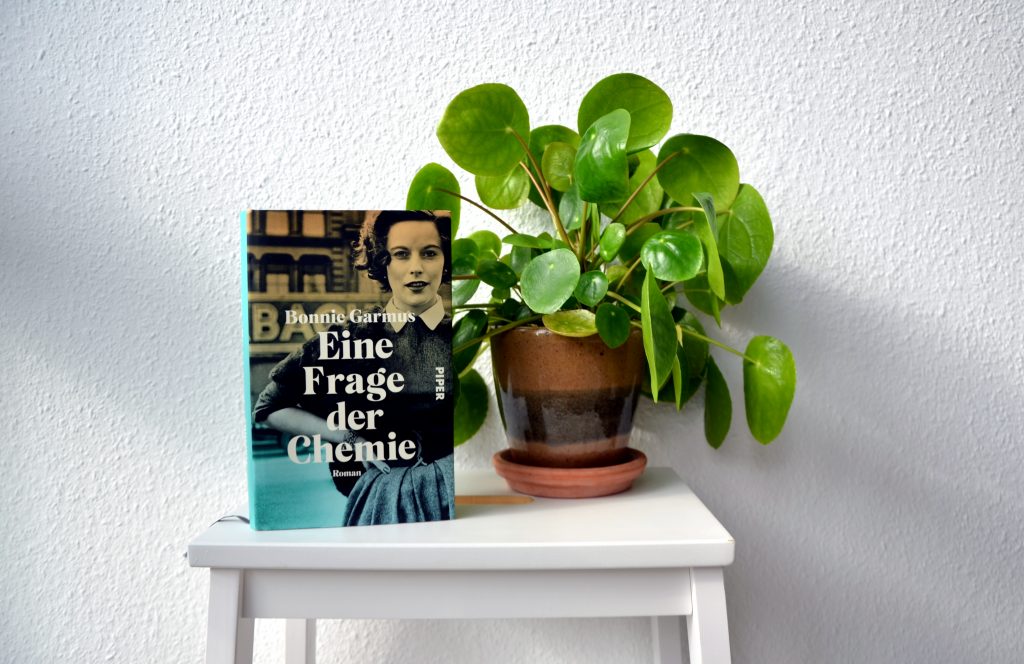
As it is summer holiday time for many, this month’s blog post has something a bit different in store than usual. I’m the kind of person that can happily spend her holidays curled up with a few good books, so today I’d like to share some thoughts about one of my latest reads with you. Don’t worry, there’s science in it of course! While I tried to avoid any major spoilers, the following text includes some details of the plot of Lessons in Chemistry.
The plot of Lessons in Chemistry written by Bonnie Garmus starts off in 1952 when the book’s fictional protagonist Elizabeth Zott is working on obtaining her PhD in chemistry at a small research institute in Southern California, USA. The book trails her passion for abiogenesis research as well as the love story between her and the institute’s star scientist Calvin Evans. The largest part of the book is set about ten years later though. In 1961, Elizabeth is the single mother of a five-year-old girl. To support her small family (also including a dog) she was forced to give up research and host a TV cooking show for America’s housewives. To Elizabeth cooking is nothing more than chemistry, however, and she uses her new-found fame for teaching her audience science – and female empowerment.
The main topic of the book is the sexism that Elizabeth encounters on a daily basis both as a scientist and as a mother. She has to fight for everything – her colleagues’ respect, research funding, even beakers. When she finally becomes pregnant, she is simply fired. In a slightly absurd scene, she converts her kitchen into a laboratory to still be able to pursue her research. I see it very positively that the author doesn’t go for a plot line in which Elizabeth makes a major scientific breakthrough in her kitchen. The message that even well educated, brilliant women need the resources to do great science is far more realistic. To paraphrase Virginia Woolf, they need a lab of their own.
And Elizabeth is depicted as very brilliant. And attractive. And athletic. In fact, she is a little bit too perfect for my taste. Do women really need to be extraordinary to find their rightful place in the world, to find equality? I get it, in the fifties women probably had to prove themselves over and over to even be admitted to university let alone a PhD program so we first meet Elizabeth only after a harsh selection process. Still, as a female researcher reading this in 2022 she often feels more intimidating than inspiring.
In the book though Elizabeth turns from a lone fighter to a woman that inspires others by again and again pointing out that sexist structures and behaviours are in fact not natural or unchangeable. One of the biggest strengths of the book is that none of its characters are magically immune to their upbringing in a patriarchal society. Instead, in the beginning, heroes and villains all have clear, rather sexist views of where a woman’s place in society should be. The distinction is made when the “good guys” start to reflect and change their own thinking and behaviour when seeing Elizabeth defying those stereotypes. Often they get rewarded by living a happier, more free life conveying the message that feminism in the end benefits all regardless of their gender.We have come a long way since 1961, but we are still far away from complete equality. Sexist comments, the gender pay gap and sexual harassment are sadly still not gone from science and Lessons in Chemistry should therefore not be read as a historical novel but as a story still relevant today. The book wraps this important and serious message into a story about love, loss and building a family. Passages told from the perspective of Elizabeth’s dog and funny incidents from her cooking show break the seriousness of the book’s main topic and make it a delightful read that can be very well enjoyed while lying on a beach somewhere.
Svenja Lohmann
is a researcher at Helmholtz-Zentrum
Dresden-Rossendorf, PhD in physics and RealSciNano member